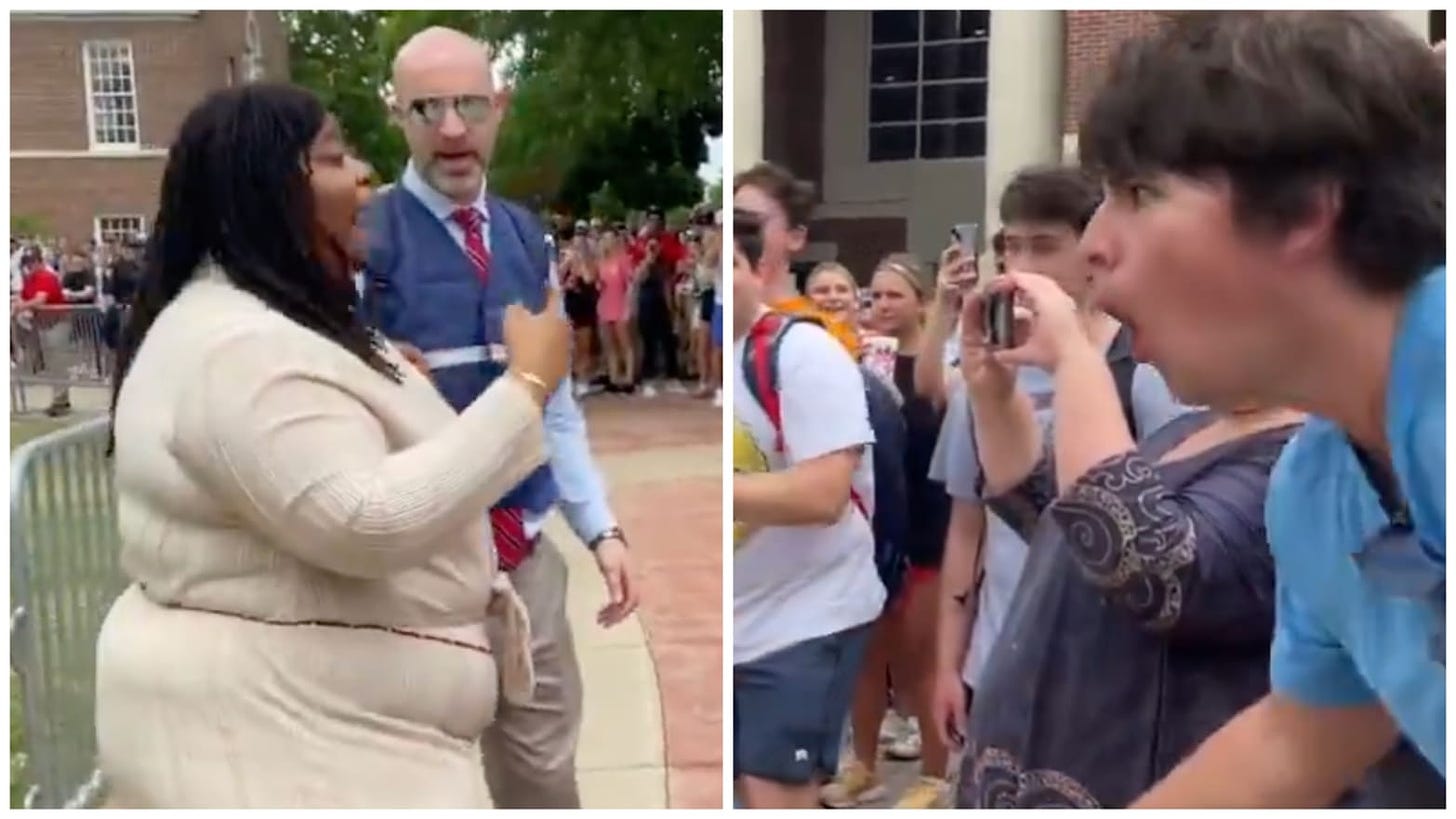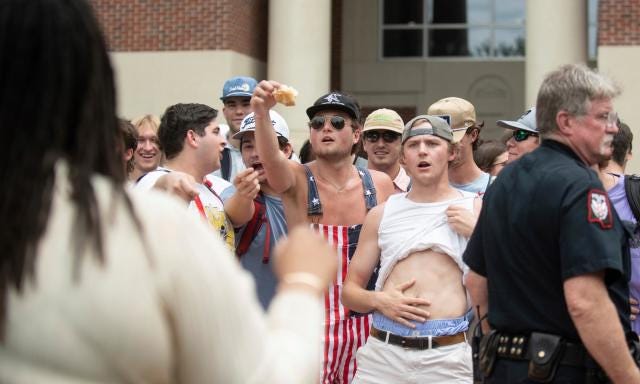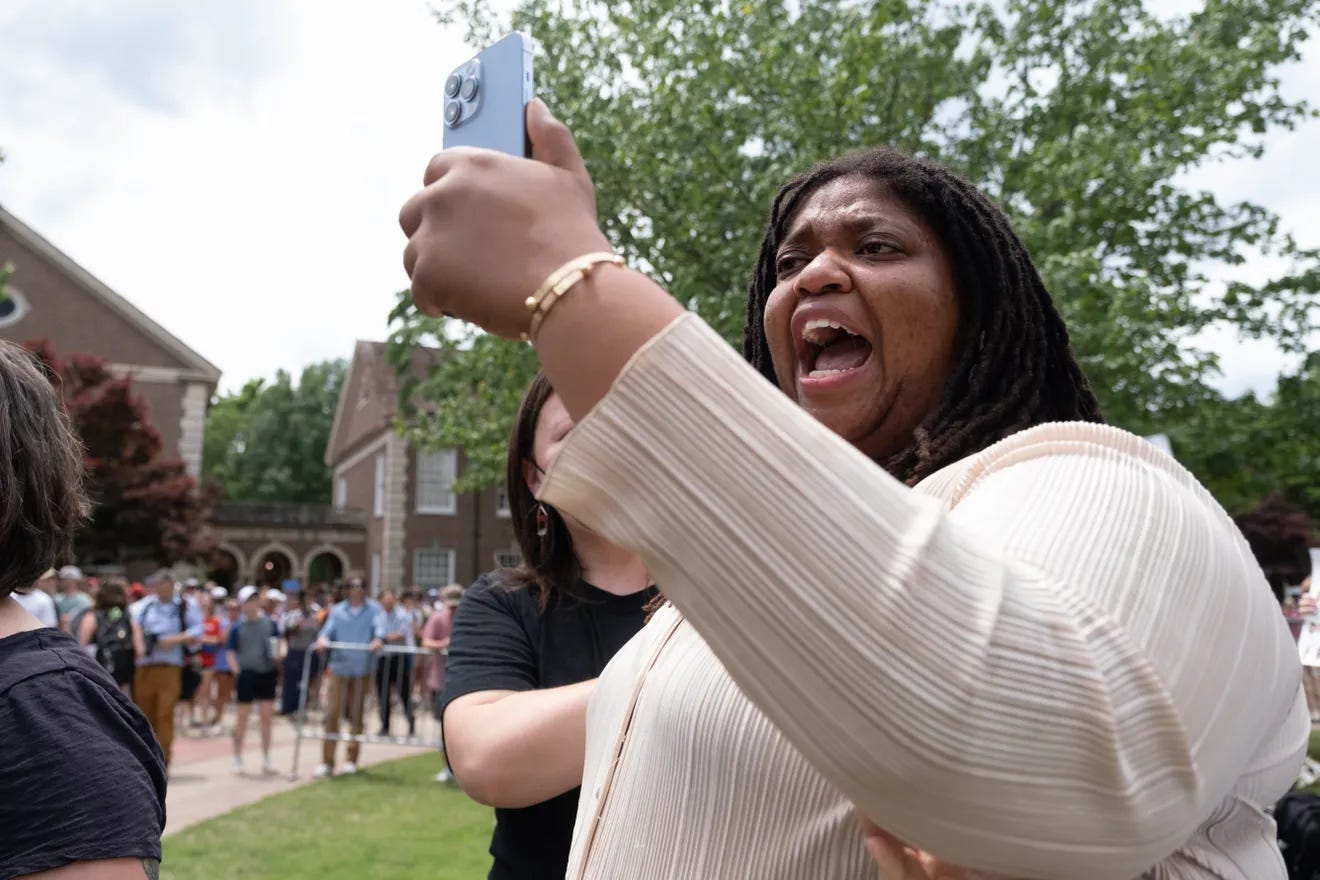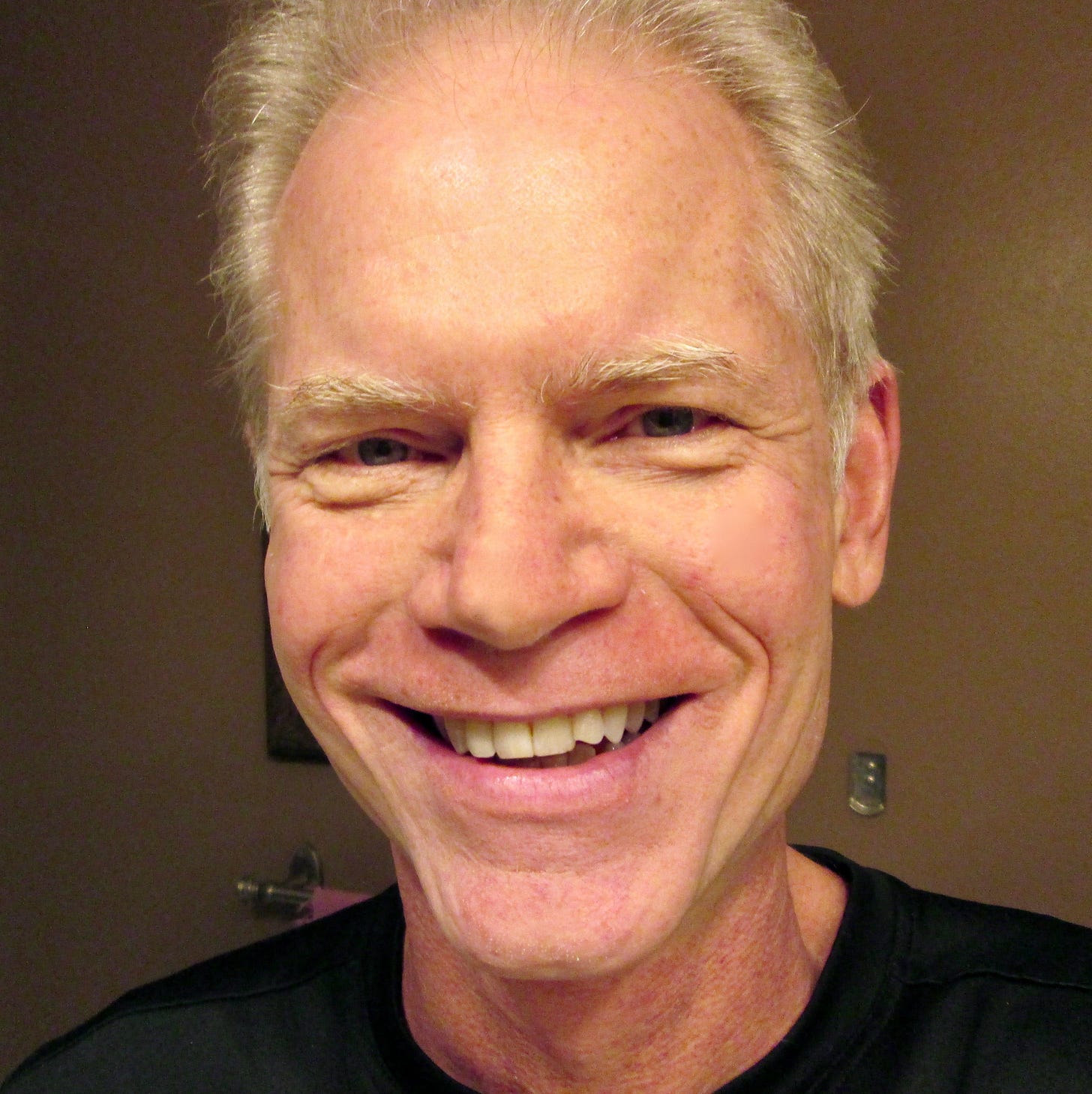Campus protests
THE FREEST THING ON EARTH
A black woman, white men, and the latest battle of Ole Miss
Adam Gussow
“Well, you know whut dey say ‘uh white man and uh n----r
woman is de freest thing on earth.’ Dey do as dey please.” —Zora Neale Hurston, Their Eyes Were Watching GodOn any normal Thursday, I would have had a ringside seat to the festivities. The office I’ve occupied at the University of Mississippi for the past twenty-two years, on the second floor of Bondurant Hall, overlooks the Quad where it all took place. But it just so happened that I was getting my hair cut at 11:30 AM, and after that I drove home for lunch and a nap. One day left in the term, one last class to teach on Friday morning. The academic year was racing to a close. Time to back off the throttle and catch my breath.
So I missed it all: the battle on the Quad that rapidly went viral, where fifty-odd demonstrators in solidarity with the people of Palestine were dwarfed by a much larger crowd of what appeared to be Ole Miss frat boys, several in sleeveless Uncle Sam jumpsuits, one of whom, sporting a powder-blue Ole Miss polo shirt, briefly jumped in place, monkey-like, splaying his arms and contorting his face as he made the sort of agitated simian noises I used to make as a kid when I was imitating Judy the chimp from “Daktari” (1966-69), the TV show set in a fictional East African game reserve.

What provoked him to make those noises, it would appear from the viral video, was UM journalism grad student Jaylin R. Smith, a large black woman in a cream-colored pantsuit who, determined to cover the uproar and not satisfied with being corralled with protestors behind the barricades assembled by UM police to separate the surging, riled-up combatants, came around the barricade, shouting at the mass of hollering white men and flipping them the finger as they chanted “Lizzo! Lizzo!,” fat-shaming her, or trying to, with riotous abandon.
Smith, who was quickly urged back into place by a trio of white security guards, seemed completely unintimidated by the frat boys. To date, no reports have clarified what she was shouting at them, but she spoke later, with refreshing candor, about that moment. “The monkey gestures—and people calling me fat or Lizzo—didn’t hurt my feelings, because I know what I am. I am so confident in my Blackness. I am so confident in my size, in the way that I wear my hair, and who I am. They do not bother me. If anything, I felt pity for them for how stupidly they acted. I said some insults back, too. I cursed like a sailor at them, and I regret letting them get to me like that.”
I missed it all. But everybody involved, it turned out, had an iPhone. And word of what had happened down in Mississippi, not a hundred feet from my office window, would spread, and spread, and spread. It was 1962 all over again! It was 1957 in Little Rock—the battle of Central High School! It was leering, looming, all-powerful Whiteness. And, of course, it was Racism.
When I returned to campus at 2:30 that afternoon and walked towards the side door in Bondurant, I noticed a trio of well-dressed administrators walking slowly, with a deliberative air, from the chapel towards the library. Two white men, one black woman. (I may preach colorblindness, but my mind still performs this sort of racial sorting.) One of the men waved at me: provost Noel Wilkin, somebody I recognized, of course, but not somebody from whom I’d expect a friendly wave at a distance. (The black woman, I now believe, was Viola Acoff, Dean of the School of Engineering.)
Wilkin and the others were leaving the annual Ole Miss memorial service, I would find out later. And the space they were about to traverse, now quiet, was where the latest Battle of Ole Miss had taken place only an hour earlier. Wilkin, I figured out when I learned of the riot I had managed to miss, was subtly signaling brotherhood: not the brotherhood of white men, but the brotherhood of adults in the room, longtimers who had skin in the game and would be forced to clean up the mess somebody else had made. Once again, the University of Mississippi—the institution we both loved, in the state we had come to call home—was about to take it on the chin.
Because there is a certain kind of story, a big loud violent story of racial antagonism gone rogue, that makes Mississippi, and Ole Miss, legible, graspable, to the rest of America. We all know this. And it hurts. If it seems as though I’m easing into this essay by way of a poor imitation of Tom Wolfe’s insouciant New Journalistic voice—well, yes. I’m laughing to keep from crying. We know how this works. We’ve been here before, as Huck might have said.
There’s a particular piquancy in my case because my wife, the black woman I’ve loved, honored, and obeyed for the past twenty years, works at the School of Biomolecular Sciences, a five minute walk from the Quad, and because our son will be a freshman at Ole Miss this coming fall. It would be fair to say that I winced when, on Friday morning, I finally watched the viral video and saw the young man in the powder-blue shirt, later identified as Texas native James “JP” Staples, engaging in his four-second burst of monkey-talk. I don’t use the word “racism” very often. Sherrie almost never uses it. But this was bad—not just a sign of spiritual ugliness carried in the young man’s heart and liberated with a fearless abandon, a heedlessness of consequences, that some would rightly call white privilege, but a talisman that was guaranteed to explosively reactivate the mythologies that govern how this university and this state are understood by those who have no interest in the quality of life that many, including my family and I, have managed to enjoy here.
Contemporary Mississippi is better than this. We all know it. But you wouldn’t know it unless you’d spent time here. And now the latest Battle of Ole Miss has happened, and Faulkner’s ghost has risen once again, as it must—“The past is never dead. It’s not even past”—and we’ve got to deal with it: the calls for expulsion leveled by the UM chapter of the NAACP against the monkey-dancer and the two Alpha Kappa frat boys in Uncle Sam jumpsuits, assisted by others, who chanted “Lizzo!” and “Fuck you, fat-ass!” and “Fuck you, bitch!”; the chorus of black students insisting that they now feel unsafe because of what happened to Smith, although Smith’s own refusal to be intimidated by the frat boys might suggest another, more resilient attitudinal orientation; and the reputational damage Ole Miss is sure to suffer from all this, at least in the short term.
I feel for the black students. Many of them, I know, have chosen to attend the University of Mississippi rather than Jackson State or another HBCU in the face of skepticism from friends and family who, remembering James Meredith’s trials and the long, slow plod of racial progress on this campus, find it easy to say, “Ole Miss? You know they don’t want you there.” Nobody has to ask who “they” is. Now, at an end-of-the-year moment when these students wanted nothing more than to celebrate, they are forced, heartsick, either to agree with the doubters or defend halfheartedly the institution in which they’ve invested their hopes and dreams. That’s a terrible position to be put in.
And even though the university administration has fallen over itself in the past five years to supercharge its ongoing process of racial remediation with a DEI “Institutional Strategic Plan” called “Pathways to Equity,” even though the Confederate monument was banished from pole position in the Lyceum Circle to the sequestered Confederate graveyard in the summer of 2020, even though James Meredith’s statue, erected in 2006 as part of the Open Doors commemoration and vandalized with a noose in 2014 by three frat brothers from Sigma Psi Epsilon who were subsequently expelled from the university—
Well, there’s the rub. Things have changed here, even though they haven’t. The Sigma Psi chapter at Ole Miss was permanently shuttered by the national organization after that shameful behavior. And James Meredith’s statue remains. It stands guard between the Lyceum and the library: a civil rights icon supplanting the Confederate soldier of old. At age 90, James Meredith himself is, with the possible exception of Archie Manning, the most celebrated living alumnus of the University of Mississippi: welcomed back to campus every few years for one more burst of heartfelt adulation. It’s not kabuki theater. We truly admire the man. Crowds of well-wishers shake his hand as he strolls the campus on a football Saturday. His stunning act of bravery in 1962 changed the game for all of us. But the memory of the noose remains. And it hurts. What kind of a young white man would do that? How would you have to be brought up to even think about doing that? I don’t blame black students, or their parents, for brooding about such things. What happened last Thursday on the Quad, reactivating familiar old pains and fears, gives all Rebels of conscience the blues, no matter how much we admire the place and seek to honor our connection with it.
The more I think about Jaylin R. Smith stepping out front and cursing like a sailor as she gave those frat boys the finger, the more tempted I am to applaud the gesture as a long-needed fuck-you delivered to a specific troublemaking cohort within the larger university community. Yet even as I entertain this hunger to stigmatize and exact vengeance, I’m brought up short.
I think back to 2017 when African American attorney and civil rights activist Bryan Stevenson, author of Just Mercy: A Story of Justice and Redemption and founder of the Equal Justice Initiative in Montgomery, Alabama, delivered the keynote address at the Fall Convocation here on campus. Just Mercy, which had been designated as that year’s text for the Common Reading Experience and distributed to every student, faculty member, and administrator on campus, is a powerful indictment of longstanding race-based inequities within the criminal justice system, especially in the Deep South. But it is also pervaded by a hunger to redeem rather than punish, a note that Martin Luther King sounded early in the civil rights movement when, speaking about Gandhi, he wrote, “The way of acquiescence leads to moral and spiritual suicide. The way of violence leads to bitterness in the survivors and brutality in the destroyers. But the way of non-violence leads to redemption and the creation of the beloved community.”
Stevenson was eloquent that night as my wife and I sat and listened to him in the Pavilion, the recently christened athletic arena where white frat boys and many others love to hoot, holler, and shout happily as our black basketball players do their thing. I was teaching Just Mercy in Southern Studies 101 that fall, and one particular line had stuck in my head. “Each of us,” Stevenson insisted, “is more than the worst thing we’ve ever done.”
Stevenson intended those words to shift our thinking about the incarcerated boys and men he was writing about and ministering to—mostly black and poor, overcharged and overpunished by a legal system indifferent to the mitigating circumstances that marked their cases. He’d certainly shifted my thinking. (Six years later, inspired by Stevenson’s call, I would teach a blues literature course at the Mississippi State Penitentiary under the auspices of the Prison-to-College Pipeline Program started by one of my English Department colleagues, Patrick Alexander. Patrick and our incarcerated students, too, are the spirit of Ole Miss.) But today, as I listen to the UMNAACP’s calls for expulsion and feel a hunger for vengeance surge up in me, masking the heartache I’d rather not feel, I am forced to hear Stevenson’s words in a new way.
Each of us, even JP Staples, is more than the worst thing we’ve ever done. Certainly the University of Mississippi, as a modern R1 institution centered on research, teaching, and service, is far more than the worst thing we’ve ever done. Yes, Nikole Hannah-Jones, you are correct when you remind your followers on X that the name Ole Miss, which became associated with the university in 1896 thanks to the efforts of a white female undergrad named Elma Meek, had been a slavery-era term for the slave mistress, although few people I know—and certainly not my wife and son—give a damn about that particular etymology or waste a moment being wounded by it. Here we might take heart, whoever we are, from the words of Zora Neale Hurston in “How It Feels to be Colored Me.” “No,” Hurston insisted in 1928, repudiating resignation and despair,
I do not weep at the world—I am too busy sharpening my oyster knife.... Someone is always at my elbow reminding me that I am the grand-daughter of slaves. It fails to register depression with me. Slavery is sixty years in the past. The operation was successful and the patient is doing well, thank you. The terrible struggle that made me an American out of a potential slave said “On the line!” The Reconstruction said “Get set!”; and the generation before said “Go!” I am off to a flying start and I must not halt in the stretch to look behind and weep.
There is a place and time for weeping; perhaps this is one of them. But we might also, if we wished, take solace in the fact that nobody was hurt, much less killed, in the latest Battle of Ole Miss. No bullets flew; no cars were overturned and burned. Staples and his frat buddies were waving (and wearing) the American flag rather than the Confederate flag and singing “The Star Spangled Banner” rather than “Dixie.” So there’s that: a change for the better, in concrete terms, even as the racist and hurtful monkey-trope was reanimated.
Our Mississippi son, fruit of his parents’ love, has had two mentors in the University of Mississippi—one black, one white, both dedicated professionals. Trumpeter Terrell McGowan, a grad student in Music Education, took Shaun under his wing during middle school, teaching him the tools of the trade, the discipline of the woodshed, the importance of craft and comportment. Dr. Micah Everett, the low brass maestro in the Music Department, has continued the process and supercharged Shaun’s growth, gifting him with skills that helped him win the #3 chair in both trombone and euphonium in the Mississippi Lions all-state band this past spring. Our son is sharpening his oyster knife right now, ready to hit the ground running and blow hell out of his horn in the Ole Miss marching band this fall. When the Rebs play—football, basketball—we’ll be there, ready to cheer him and them on. My family and I, too, along with McGowan and Everett, not to mention Jaylin Smith, are the spirit of Ole Miss.
If anybody, speaking of last Thursday’s dispiriting drama, tells you “What did you expect? Nothing has changed at Ole Miss,” they’re either ignorant of the full picture or they’re lying to you. Or—a more generous way of putting it—they’re just not as familiar as they should be with the duality of the southern thing, the both/and logic of the blues that governs life in contemporary Mississippi. Victory is assured, if we but choose to embrace it. Those who have offended us deserve some measure of mercy, hard as that is to summon up, and a chance to straighten up and fly right. Spiritual toughness, too, is needed. Which is why Jaylin R. Smith, with her raised middle finger and her sailor’s curses, has something to teach us all about what it means to be free, not merely filled with riotous abandon.
Adam Gussow is a professor of English and Southern Studies at the University of Mississippi and a professional blues harmonica player. He is the author of numerous books on the blues, including Seems Like Murder Here: Southern Violence and the Blues Tradition (2002), Beyond the Crossroads: The Devil and the Blues Tradition (2017), and Whose Blues? Facing Up to Race and the Future of the Music (2020). A longtime member of the blues duo Satan & Adam, he and guitarist Sterling “Mr. Satan” Magee were the subjects of a 2018 documentary by that name that screened on Netflix for several years. His new book, Where We Are Now: Renewing the Dream of Beloved Community in a Troubled America, will be published next February by Emancipation Books. His last essay for FBT was “Bilbo Is Dead: An Interracial Family in Contemporary Mississippi.”







Young white men in today's America have much to be angry about. DEI, coupled with the assault on the economy by a democrat president have significantly reduced their future opportunity for realization of the American Dream. Standing there in front of them was a perfect caricature of the threat to their futures. A morbidly obese black female that they can be sure took the place of someone more qualified but rejected by the university because they were white. I am a black male boomer from the south that never experienced racism that affected my upward mobility. In 1963 as a high school student working at a Kroger grocery I was promoted to stock clerk ahead of a contingent of white bag boys, truly based on performance and attitude. I never needed DEI programs then or my next 50 successful working years. DEI programs have stirred emotions among white Americans that all black Americans will pay for in the future.
People are as white or black as they want to be. And it's something of a pathetic recreation of a specific past that enables this kind of cosplay. Yet fresh nobility is born every day - our very abilities to see and perceive love and hate, good and evil and all of the gradients between are only diminished by picking a color and a hill to die on. That drama is exciting to watch, even when nobody dies.